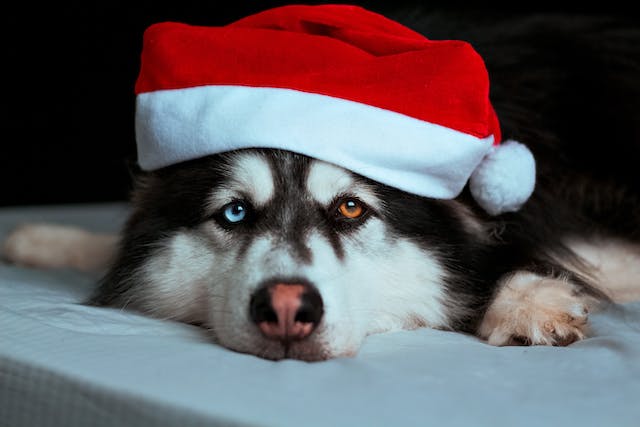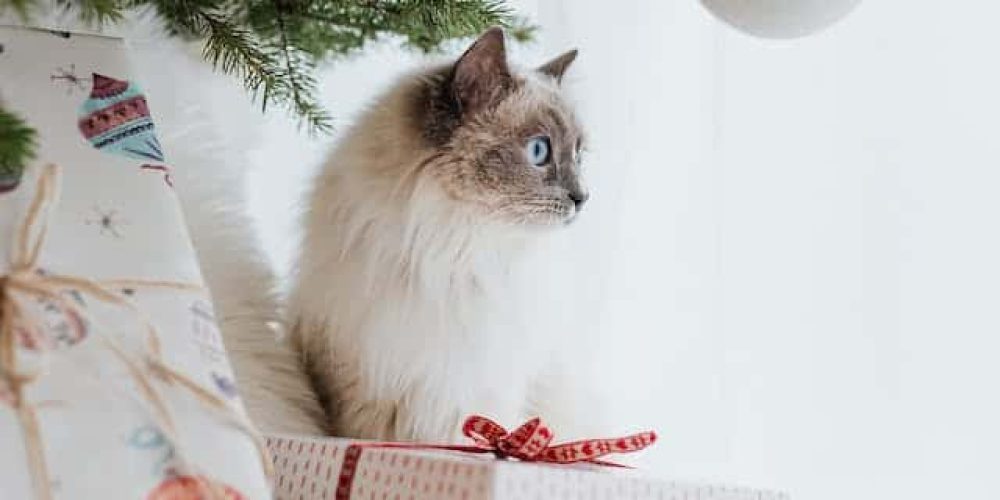Dogs and cats have been living alongside humans and growing closer to them for many thousands of years. In this time they have adapted to make the most of our habits and circumstances. They share our ups and downs and have become part of all our family celebrations and special times. And never more so than at Christmas! But despite that, many of our foods and customs can still be a bit too much for them. Eating too much or eating the wrong things at Christmas are regular human downfalls over the festive season. And sudden changes in what they eat are just as likely to give our furry friends upset tummies as well.
Some of the things we consume, such as alcohol, caffeine and chocolate, are poisonous for dogs and cats. They should never have access to them (see the first day of Christmas). Other foods may not be as harmful in small amounts. But they can cause problems when our furry friends eat a lot. Just like humans, overindulging in treats and other ‘harmless’ foods can also result in sore tummies. Foods high in fat content or hard to digest are particular risks.
Puppies and kittens, senior pets and pets suffering from ongoing illnesses, like digestive problems, pancreatitis or diabetes, are going to be most vulnerable to upset tummies from changes in food or too much food over Christmas.
Why can human foods and too many treats cause tummy upsets?
Dogs and cats are born with a set of tools to digest their food. These tools will change as young animals grow and mature. They’ll also change in response to what your pet is actually eating. Newborns start picking up good bacteria from their mum’s milk right after birth. These bacteria will settle in their guts and play an important role in supporting digestion and gut health. This population of good bacteria will also change and adapt over time.
When pets are fed something that overwhelms their digestive tools and/or good bacteria, a tummy upset ensues.
Things that are likely to cause tummy upsets include:
- Seasoned food: especially anything spicy or very salty. Your pet’s digestive system may be irritated by these substances and try to expel them through vomiting and diarrhoea.
- Dairy products: adult dogs and cats have very little ability to digest the sugars in milk (lactose). Consuming large amounts may cause bloating and diarrhoea.
- Human foods or pet treats with a lot of fat can be very difficult to digest. The more your dog or cat eats the bigger the problem. This can cause vomiting, diarrhoea and even a serious condition called pancreatitis.
- Bones and rawhide chews can irritate the stomach or become compacted as they go through the intestines, leading to a risk of blockage or severe constipation.
- Many cooked vegetables are safe to eat in small amounts. Excess can lead to lots of gas or a bloated tummy.
- Highly processed human foods (such as sausages and ham) are very difficult for pets to digest and not healthy. They should be avoided as much as possible.

How to avoid a festive tummy upset
- Have a daily treat box prepared for the family to use. This helps keep track of treats and avoid overindulgence.
- Offer a toy, like a Kong or similar treat dispenser, stuffed with a favourite treat to keep your dog occupied during mealtimes and reduce begging. Ideally, place the treat in their bowl or crate and away from the table.
What to do if a tummy upset develops
If your pet vomits but is otherwise bright and happy:
- Try withholding food for a few hours to let their tummy rest.
- Reintroduce food very gradually.
- This may be enough to settle their tummy. You can find more information in our vomiting article.
- If the vomiting continues or they are becoming quiet and lethargic, speak to a vet straight away.
Pets with diarrhoea:
- Feed small meals and highly digestible food for a few days. Things like scrambled eggs, chicken, white fish, rice and sweet potato are all good options.
- If your pet regularly gets an upset tummy, consider keeping a supply of prescription dog food such as Hills Prescription Diet i/d low fat or Royal Canin Gastrointestinal diet. More information is available in our diarrhoea article.
- Speak to a vet if the diarrhoea is very frequent, there is a significant amount of blood in it, or they seem excessively tired or distressed.
- Speak to a vet straight away if your pet’s tummy appears swollen or bloated, especially if they are also retching or lethargic.
What not to do if your pet has a tummy upset
- Don’t force your pet to drink water if they are vomiting repeatedly. This can actually worsen dehydration. Speak to a vet for treatment.
- Resting the stomach is very helpful after vomiting, but puppies and kittens should not be starved for more than 4-8 hours, depending on age.
- Even if the symptoms are mild, a tummy upset lasting more than a couple of days is likely to require treatment or investigations.
- Don’t delay speaking to a vet if your pet still has symptoms after two or three days or can only cope with eating bland food at that point.
What changes can be normal after some festive treats?
A small change in the consistency or colour of the stools can be normal when your pet overindulges or eats something they’re not used to. They may also be less excited about their normal food for a few days, but should not be completely off food. It’s not too surprising if they are a bit disappointed about their usual food, after all the excitement and the lovely smells of roast turkey and all the trimmings!
Worried about your pet? Our Joii vets are available online 24/7 over the festive period.
Joii can help with:
- Treating tummy upsets at home and recognising emergencies
- Safe food for pets at Christmas
- Anything that’s worrying you about your furry friend’s health and wellbeing at Christmas
Wishing you a happy and stress-free Christmas from all your pet family friends at Joii.

Coming soon….on the fourth day of Christmas
Christmas trees, plants, nuts and berries. What’s safe for pets (and what’s not!)











